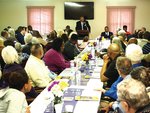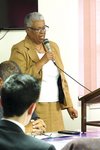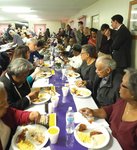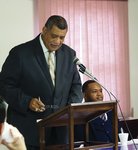





What: The annual Dr. Martin Luther King Jr. Memorial Breakfast, hosted by the West Chatham branch of the NAACP at Holy Trinity Church in Siler City on Saturday morning, attended by more than 150 people. The event featured addresses from Chatham County Commissioner Diana Hales and keynote speaker Xavier Daniels, plus recognition and a benediction from emcee the Rev. Dr. Carl Thompson Sr., as well as reflections and a call to action from branch President Larry Brooks.
Diana Hales: Hales recounted her own remembrances of the events of “Bloody Sunday” (when about 600 people left Selma, Alabama, March 7, 1965, for a 50-mile march to Montgomery to demand an end to discrimination in voter registration; the group was attacked near the Edmund Pettus Bridge and driven back to Selma) and her experiences witnessing racial prejudice and memories of the Civil Rights struggles during her days as a student at a Christian college in Indiana.
Hales said as a student she received anonymous letters telling her “not to be friends with these dark people,” and calling her a “stupid white woman” and warning her “not to be alone” with a black man. She described the code of white supremacy as assigning human worth to a single factor — skin pigmentation — and recalled the passage of the Voting Rights Act of 1965.
Today, she said, white supremacy is not passé; more people are aware of it and calling it out by name. Hales said she trusted that one day we’d reach Dr. King’s desire, expressed in his “I Have a Dream” speech in 1963 that a time would come when people would be judged not by the color of their skin, but by the content of their character.
Xavier Daniels: Keynote speaker Daniels, youth minister at Simon Temple A.M.E. Zion Church in Fayetteville, quoted a passage from King’s book “Where Do We Go From Here: Chaos or Community” addressing white backlash to the Voting Rights Act. “In several Southern states,” Daniels quoted King as writing, “men long regarded as political clowns had become governors or only narrowly missed election, their magic achieved with a ‘witches’’ brew of bigotry, prejudice, half-truths and whole lies.”
“We’ve been here before,” Daniels said.
Instead of the country embracing change after the legislative gains of 1964 and 1965, Daniels said, “troubled waters” continued. He cited examples of continued discrimination and violence, and said marchers in 1965 were not embraced with the ballot and the pen, but with police brutality and mobs.
“Everyone was invited to the party,” Daniels said, “but everybody wasn’t dancing.”
Daniels said there’s familiarity in today’s society. The “hope and change” espoused by President Obama after his election in 2008 wasn’t embraced, Daniels said, but instead the nation has become more divided. He cited the slaying of Trayvon Martin and other blacks killed by police and talked about white supremacy marches in Charlottesville, Virginia, and elsewhere, calling out President Trump for saying there were “good people” involved.
“We’ve been down this road before,” he said. “It’s time to try something different.”
Daniels said gerrymandering should end, alternative sentencing and expanded rehabilitation services to prisons should be encouraged, a moratorium on building prisons should be enacted, livable wages should be paid to all workers and more minority teachers should be hired in schools, among other changes.
“Let’s do something different,” he said. “Let’s talk a new language.”
And anytime you feel “disencouraged,” he said, you “should remember another man who has been here before, who told us, ‘Be of good cheer.’”
The Rev. Dr. Carl Thompson: Thompson, a member of the “Chatham For All” group which has fought for the removal of the “Our Confederate Heroes” memorial in Pittsboro, outlined the group’s efforts. He praised the work of Chatham Commissioners Mike Dasher, Karen Howard, Jim Crawford and Diana Hales — each of whom was in attendance — and cited their unwavering commitment to equality and justice and their “raw courage” in the face of hate and threats as they ruled in favor of the monument’s removal.
“On behalf of all fair-minded citizens, we say ‘thank you,’” Thompson said. The commissioners received a standing ovation.
West Chatham NAACP President Larry Brooks spoke about the organization’s mission, telling the audience, “You can’t do too much when you’re standing up for the rights of people.”
Gwen Payne, a member of the West Chatham NAACP, performed several songs, and the Rev. Dr. Ricky Frazier, the presiding elder of the Durham District A.M.E. Zion Church, gave the invocation. Host church pastor David Henderson provided a welcome.